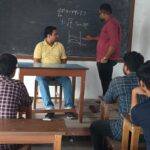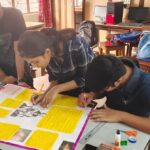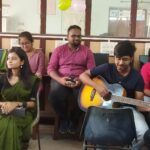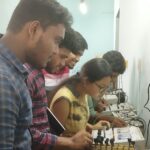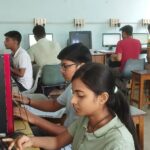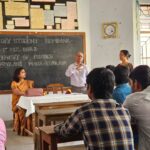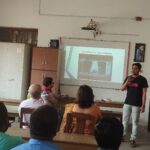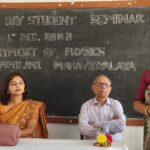- About the Department
- Faculty Profile
- Courses Offered
- PO and CO
- Certificate / Add-on courses
- Teaching-learning
- Result and student progression
- Departmental Activities and Achievements
- Alumni
- Photo Gallery
Brief Description of the Department
The Department is located at second floor in main building. There are separate laboratories for both honours and general students. They are also well divided as dark room for optical experiments, computer, electronics, electrical & other experimental laboratories. All laboratories are fully equipped and function well. In addition to the central library of the college, the department is well equipped with a departmental library containing more three hundred books for the need of its faculties and students.
Apart from UG Course, the Department also conduct M. Sc. Physics Course as a Centre for Distance and Online Education (CDOE) under Vidyasagar University.
Vision:
- To excel in quality based science education by igniting the young talented minds with novel ideas and to develop a scientific temper and a sense of social commitment in students.
- To build a foundation for excellence in the field of physics and encourage the students by igniting and promoting enthusiasm, interests and passion.
Mission:
- To impart quality education both in theoretical and experimental physics through effective Teaching Learning process and to motivate students to pursue higher studies in Physics to improve their career forecasts.
- To support the developmental activities of the college by encouraging the students to participate both in co-curricular and extracurricular events.
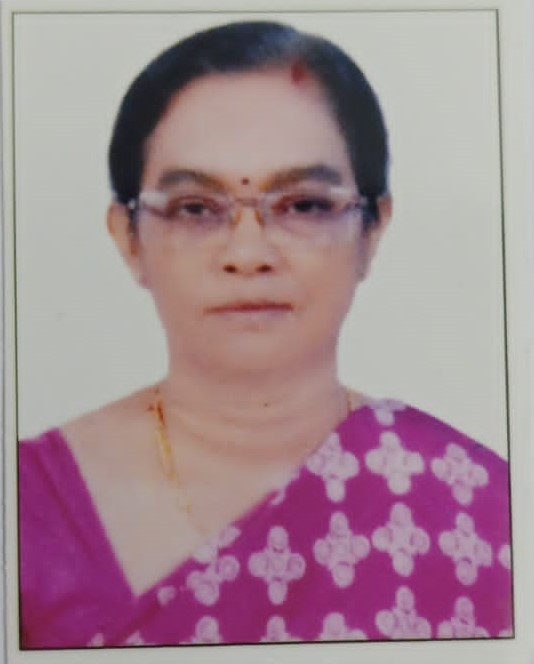
Dr. Kalpana Santra
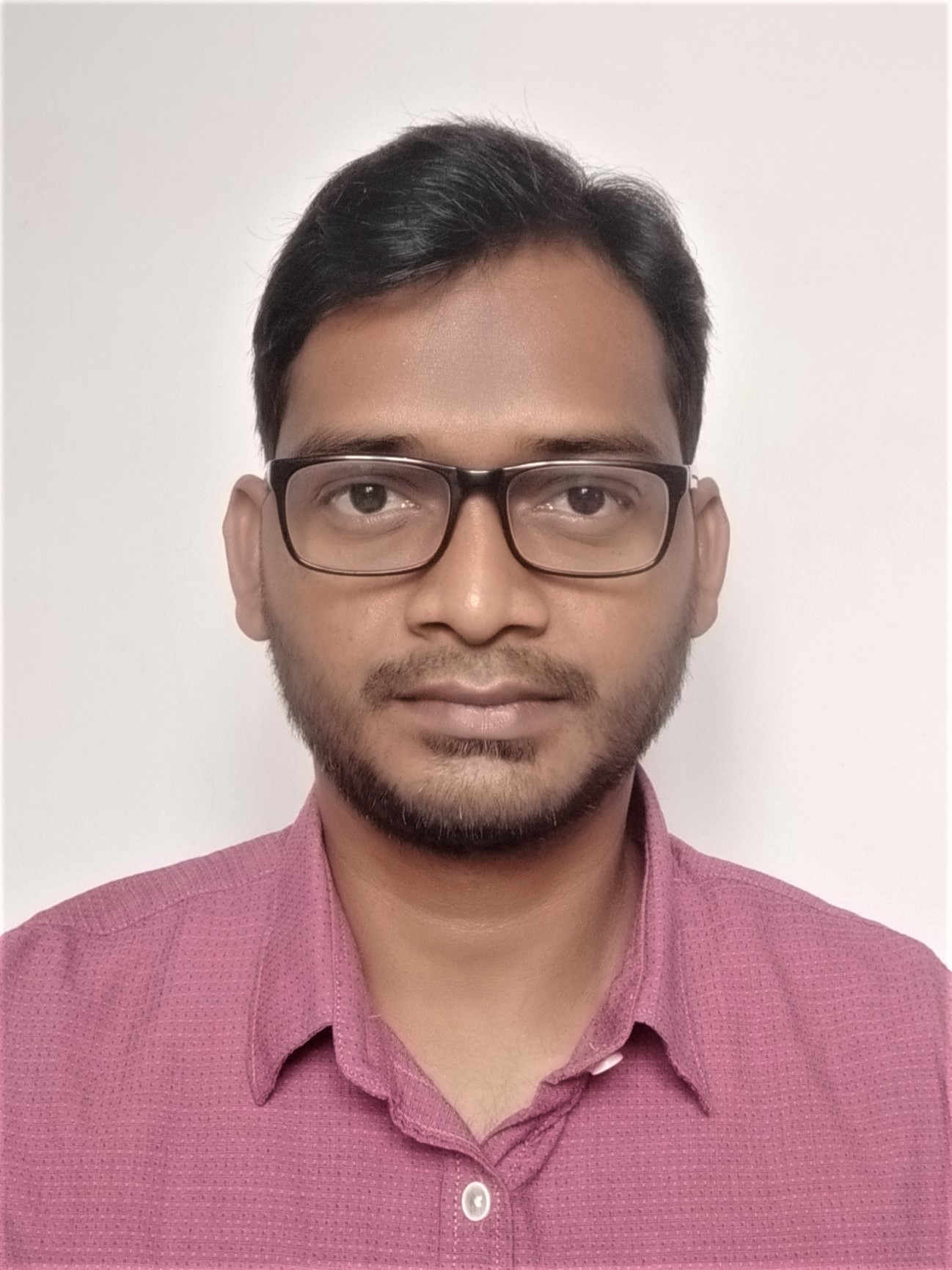
Sri Ujjal Saren
Designation: Assistant Professor
Email: sarenujjal@gmail.com
Phone Number: 8697977797
Get Detail »
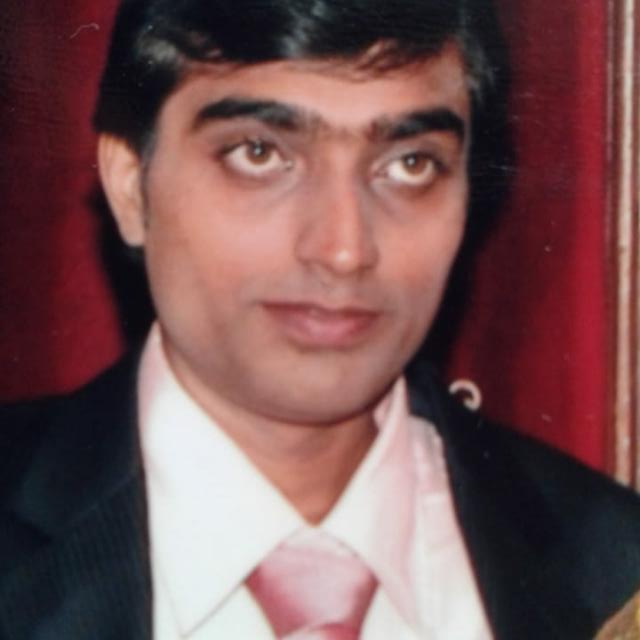
Sri. Abhedananda Bhattacharya
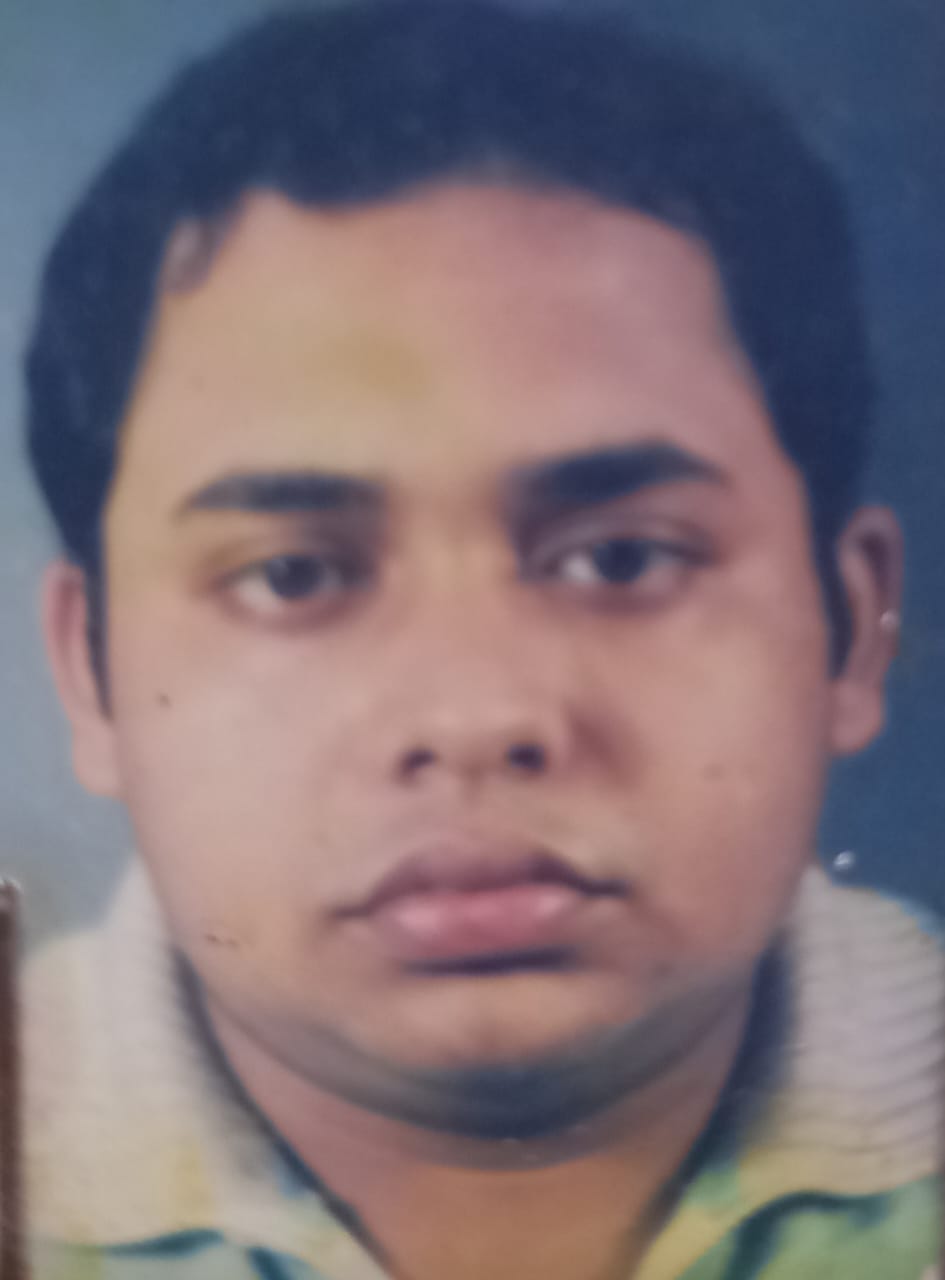
Dr. Bipan Dutta
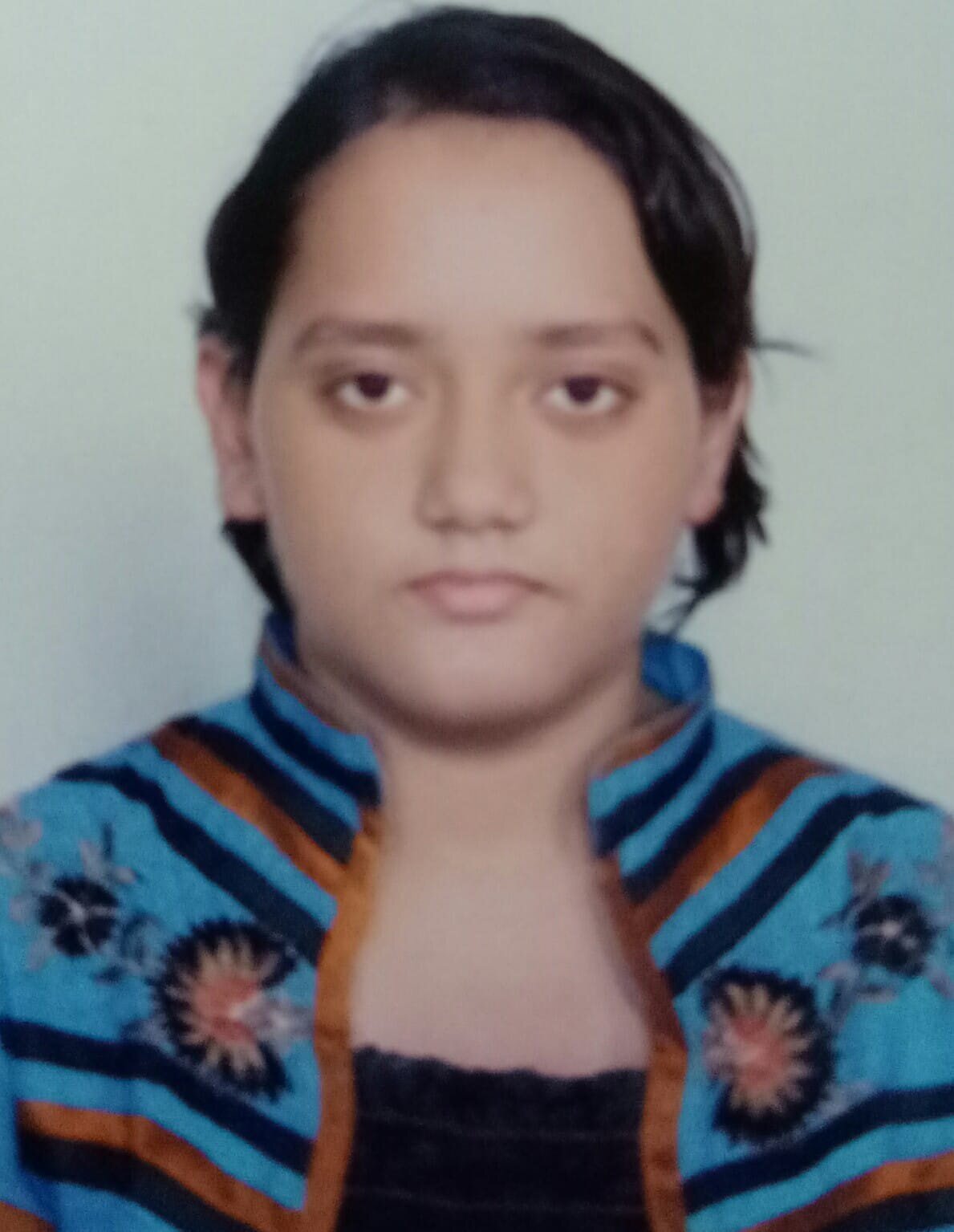
Smt. Ipsita Sen
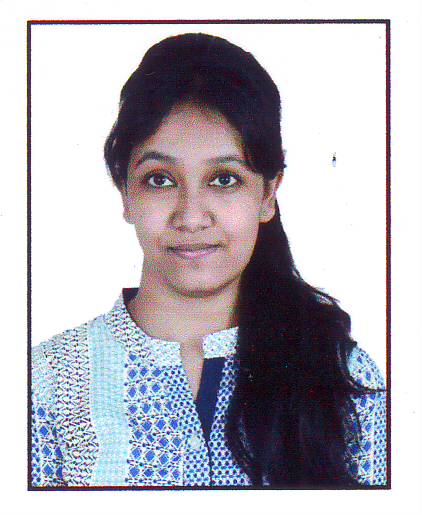
Smt. Sayantani Kar
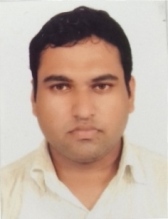
Sri Ananya Kumar Kundu
Designation: SACT
Email: ananyakumar2012@gmail.com
Phone Number: 8910081106
Get Detail »
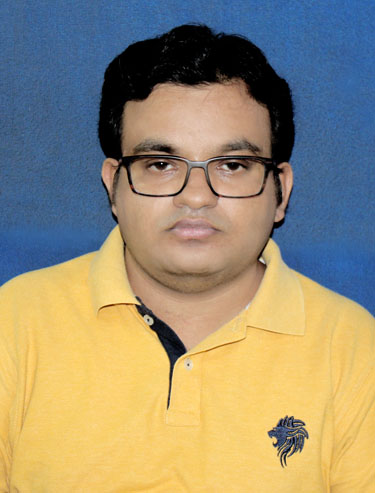
Dr. Sannak Dutta Roy
Designation: SACT
Email: sannak300@gmail.com
Phone Number: 9932943198Get Detail »
Course Outcomes & Program Outcomes (CBCS)
Department of Physics
Course Outcomes
Physics Honours (PHSA)
| Semester | Name of Course | Course Outcomes |
|
I |
PHS-A-CC-1-1 Mathematical Physics I |
1) The students will get an overview on mathematical tools required to study theoretical and experimental physics. 2) They learn basic computation using python and 2D plotting using Gnuplot. |
|
I |
PHS-A-CC-1-2 Mechanics |
1) Students will learn basics Physics based on Newtonian Mechanics and earn general ideas about how the universe works. 2) They learn to experimentally verify different laws based on Newtonian Mechanics. |
|
II |
PHS-A-CC-2-3 Electricity & Magnetism |
1) The students will be given an idea about electricity and magnetism with various electromagnetic phenomena such as electromagnetic induction, electrical circuits, etc. 2) It explains the students about various applications of electricity and magnetism in our daily life. 3) The students will be able to perform various experiments on electricity and magnetism and will learn to handle various electrical equipment. |
|
II |
PHS-A-CC-2-4 Waves & Optics |
1) The students will be given basic knowledge in vibration and wave motion. 2) They will get an insight about various optical phenomena like interference, diffraction and polarization of light. 3) They will learn applications of optics and familiarizes with experimental instruments. |
|
III |
PHS-A-CC-3-5 Mathematical Physics II |
1) Students will learn more advanced topics of mathematical physics like Fourier series, series solutions of the differential equations, some special functions and their applications. 2) Students will familiar with different packages of Python like numpy, scipy, matplotlib etc. and apply them to find the solutions of matrix algebra, numerical integration, interpolation, differential equation and curve fitting. |
|
III |
PHS-A-CC-3-6 Thermal Physics |
1) In this course, students learn the fundamental laws of thermodynamics, the principle of operation of engines and refrigerators and limitations related to ideal gas. 2) They will perform different experiments on heat and thermodynamics that will enhance their experimental skill. |
|
III |
PHS-A-CC-3-7 Modern Physics |
1) Students learn about old quantum theory, Schrodinger’s equation, basics of nuclear physics and radioactivity. 2) They will also learn fundamental principle of Laser and its applications. 3) Laboratory classes will enable students to determine the value of Planck’s constant, study of photoelectric effect, verification of Stefan’s law of radiation, determination of e/m of electron and behaviour of tunnel diode. |
|
III |
PHS-A SEC-A 1 Scientific Writing |
1) Students will familiar with scientific writing tool LATEX. 2) They learn how LaTeX makes all writing tasks simpler, more visually appealing, more consistent, more reproducible and transparent. 3) They will learn how to prepare a scientific article containing figures, tables and mathematical equations in a presentable form. |
|
IV |
PHS-A-CC-4-8 Mathematical Physics III |
1) The students will learn advanced mathematical physics such as complex analysis and its application, integral transform, probability theory. 2) They will also learn concept of special theory of relativity which is extremely essential for understanding the physical world beyond Newtonian mechanics. 3) They learn to handle numerical problems involving solutions of ODEs, PDEs and complex analysis using Python. |
|
IV |
PHS-A-CC-4-9 Analog Systems and Applications |
1) They learn basics of analog electronics, fundamentals of semiconductor physics and its application which is the heart of the modern-day electronic devices. 2) In laboratory classes, they are familiarized with the electronic devices and to design and perform experiments with electronic components. |
|
IV |
PHS-A-CC-4-10 Quantum Mechanics |
1) Students will be taught quantum mechanics theory based on Schrodinger equation. 2) They also learn atomic spectra and energy distribution in electric and magnetic fields. 3) The numerical solution of some of the Schrodinger equations in Python will be taught in the laboratory. |
|
IV |
PHS-A-SEC-B 1 Arduino |
1) Arduino offers to learn basic electronics, circuit connection to breadboard, programming language and IDE. 2) Projects based on Arduino enable students to design circuits and enrich their computer programming skills. |
|
V |
PHS-A-CC-5-11 Electromagnetic Theory |
1) This course teaches the students about the origin and different properties of the EM waves in bounded and unbounded media. 2) Electromagnetic origin of wave optics and polarization is also being discussed in this course. 3) Students learn the verification of different physical laws related to the EM wave propagation and polarization in laboratory classes. |
|
V |
PHS-A-CC-5-12 Statistical Physics |
1) Students will be able to understand the behaviour and dynamics of a system comprising of a large number of particles both classically and quantum mechanically. 2) They learn Python programming to analyze the behaviour of a collection of particles through numerically calculate partition function and other physical properties. |
|
V |
PHS-A-DSE-A1 (b) Laser and Fiber Optics |
1) Students will be able to learn the basic and the generation of different types of LASER and their applications. 2) They learn principles and applications of holography. |
|
V |
PHS-A-DSE-B1 (b) Nuclear and Particle Physics
|
1) Nuclear Physics introduces the student to the concept of nuclear reaction, interaction of nuclear radiation with matter and detectors for nuclear radiation. 2) They also learn about fundamental particles and their properties. |
|
VI |
PHS-A-CC-6-14 Digital Systems and Applications |
1) Students learn about number systems, basic gates, counters and registers. 2) In practical classes, they learn to design and construct universal gates, half adders and full adders, flip-flops on breadboard. |
|
VI |
PHS-A-CC-6-13 Solid State Physics |
1) This course explains the physical properties of the material in solid states as an application of quantum mechanics. 2) The details of crystallography, basis of semiconductors and superconductors are also theoretically addressed. 3) They learn to verify different laws and properties of materials in laboratory. |
|
VI |
PHS-A-DSE-A2 (a) Nano Materials and Applications |
1) The exciting world of nanoscience and nanotechnology is being discussed here through the basic physics underlying the concept of nanoparticles. 2) Students learn the synthesis, properties and various applications of the nano materials. |
| VI |
PHS-A-DSE-B2 (a) Communication Electronics |
1) In this course, the basics of electronic communications, analog and digital modulations are addressed. 2) Students get an idea about how navigation system works. |
Physics General (PHSG)
| Semester | Name of Course | Course Outcomes |
|
I |
PHS-G-CC-1-1 Mechanics |
1) This course offers Newtonian mechanics and its application in explaining various classical phenomena. 2) Students learn to perform experiments to calculate different quantities related to Newtonian mechanics. |
|
II |
PHS-G-CC-2-2 Electricity and Magnetism |
1) Students will earn knowledge about electricity and magnetism and various electromagnetic phenomena such as electromagnetic induction, electrical circuits, etc. 2) They will be familiar with various experiments on electricity and magnetism. |
|
III |
PHS-G-CC-3-3 Thermal Physics and Statistical Mechanics |
1) In this course, students will learn thermodynamics to explain the fundamental laws of nature and brief outline of statistical mechanics. 2) They will perform different experiments on heat and thermodynamics that will enhance their experimental skill. |
|
III |
PHS-G-SEC-B Renewable energy and Energy Harvesting |
1) Students are able to understand the concept of fossil fuels and alternate Sources of energy. 2) They learn in detail about various renewable energy sources like solar energy, wind energy harvesting, geothermal energy, hydroenergy, piezoelectric Energy harvesting and electromagnetic energy harvesting. |
|
IV |
PHS-G-CC-4-4 Waves and Optics |
4) The students will be given basic knowledge in vibration and wave motion. 5) They will get an idea about various optical phenomena like interference, diffraction and polarization of light. 6) They will learn applications of optics and familiarizes with experimental instruments. |
|
IV |
PHS-G-SEC-B Arduino |
3) Arduino offers to learn basic electronics, circuit connection to breadboard, programming language and IDE. 4) Projects based on Arduino enable students to design circuits and enrich their computer programming skills. |
|
V |
PHS-G-DSE-A Analog Electronics |
3) They learn basics of analog electronics, fundamentals of semiconductor physics and its application which is the heart of the modern-day electronic devices. 4) In laboratory classes, they are familiarized with the electronic devices and to design and perform experiments with electronic components. |
|
VI |
PHS-G-DSE-B Digital Electronics |
3) Students learn about number systems, basic gates, counters and registers. 4) In practical classes, they learn to design and construct universal gates, half adders and full adders, flip-flops on breadboard. |
Program Outcomes
- Science-based knowledge
Students earn basic knowledge about the working principle of different fundamental phenomena. It helps students to understand how this physical world and universe governed by laws of Physics.
- Critical thinking
They acquire knowledge to identify, formulate, analysis and solve problems. They are able to express their creativity to see the world in a new way.
- Skill enhancement
Students can enhance themselves by various skills like problem-solving, communication, technical skills and research/project development skills which are effective in social and professional fields.
- Science and society
Students learn the necessity and impact of science especially Physics in society. They also learn how to use modern tools in our day-today life.
- Ethics
Applying ethical principles and knowledge of Physics they commit to professional activities and responsibilities based on science and engineering.
- Environment and sustainability
Understanding the impact of science and engineering on environment. Students are being self-conscious for use of environment friendly alternate energy resources and activities for its sustainability. They are also encouraged for inventory works on renewable energy and energy harvesting.
- Communication
Students are being able to communicate effectively via the process of exchanging ideas, thoughts, opinions and data among various science communities and people in society. They may able to design documentations and write effective articles and spread it to people via social media.
- Life-long learning
Continuous knowledge gathering from science and engineering helps independent, self-motivated, life-long learning in the broadest context of both personal and professional fields.
- Undergraduate Physics (CBCS): 3 Year Honours
- Undergraduate Physics (CCF): 4 Year Honours with Research
- Undergraduate Physics (CBCS): 3 Year B.Sc. General
- Undergraduate Physics (CCF): 3 Year B.Sc. MDC
- Physics Honours (PHSA)
| Semester | Name of Course | Course Outcomes |
|
I |
PHS-A-CC-1-1 Mathematical Physics I |
CO1 1) The students will get an overview on mathematical tools required to study theoretical and experimental physics. 2) They learn basic computation using python and 2D plotting using Gnuplot. |
|
I |
PHS-A-CC-1-2 Mechanics |
CO2 1) Students will learn basics Physics based on Newtonian Mechanics and earn general ideas about how the universe works. 2) They learn to experimentally verify different laws based on Newtonian Mechanics. |
|
II |
PHS-A-CC-2-3 Electricity & Magnetism |
CO3 1) The students will be given an idea about electricity and magnetism with various electromagnetic phenomena such as electromagnetic induction, electrical circuits, etc. 2) It explains the students about various applications of electricity and magnetism in our daily life. 3) The students will be able to perform various experiments on electricity and magnetism and will learn to handle various electrical equipments. |
|
II |
PHS-A-CC-2-4 Waves & Optics |
CO4 1) The students will be given basic knowledge in vibration and wave motion. 2) They will get an insight about various optical phenomena like interference, diffraction and polarization of light. 3) They will learn applications of optics and familiarizes with experimental instruments. |
|
III |
PHS-A-CC-3-5 Mathematical Physics II |
CO5 1) Students will learn more advanced topics of mathematical physics like Fourier series, series solutions of the differential equations, some special functions and their applications. 2) Students will familiar with different packages of Python like numpy, scipy, matplotlib etc. and apply them to find the solutions of matrix algebra, numerical integration, interpolation, differential equation and curve fitting. |
|
III |
PHS-A-CC-3-6 Thermal Physics |
CO6 1) In this course, students learn the fundamental laws of thermodynamics, the principle of operation of engines and refrigerators and limitations related to ideal gas. 2) They will perform different experiments on heat and thermodynamics that will enhance their experimental skill. |
|
III |
PHS-A-CC-3-7 Modern Physics |
CO7 1) Students learn about old quantum theory, Schrodinger’s equation, basics of nuclear physics and radioactivity. 2) They will also learn fundamental principle of Laser and its applications. 3) Laboratory classes will enable students to determine the value of Planck’s constant, study of photoelectric effect, verification of Stefan’s law of radiation, determination of e/m of electron and behaviour of tunnel diode. |
|
III |
PHS-A SEC-A 1 Scientific Writing |
CO8 1) Students will familiar with scientific writing tool LATEX. 2) They learn how LaTeX makes all writing tasks simpler, more visually appealing, more consistent, more reproducible and transparent. 3) They will learn how to prepare a scientific article containing figures, tables and mathematical equations in a presentable form. |
|
IV |
PHS-A-CC-4-8 Mathematical Physics III |
CO9 1) The students will learn advanced mathematical physics such as complex analysis and its application, integral transform, probability theory. 2) They will also learn concept of special theory of relativity which is extremely essential for understanding the physical world beyond Newtonian mechanics. 3) They learn to handle numerical problems involving solutions of ODEs, PDEs and complex analysis using Python. |
|
IV |
PHS-A-CC-4-9 Analog Systems and Applications |
CO10 1) They learn basics of analog electronics, fundamentals of semiconductor physics and its application which is the heart of the modern-day electronic devices. 2) In laboratory classes, they are familiarized with the electronic devices and to design and perform experiments with electronic components. |
|
IV |
PHS-A-CC-4-10 Quantum Mechanics |
CO11 1) Students will be taught quantum mechanics theory based on Schrodinger equation. 2) They also learn atomic spectra and energy distribution in electric and magnetic fields. 3) The numerical solution of some of the Schrodinger equations in Python will be taught in the laboratory. |
|
IV |
PHS-A-SEC-B 1 Arduino |
CO12 1) Arduino offers to learn basic electronics, circuit connection to breadboard, programming language and IDE. 2) Projects based on Arduino enable students to design circuits and enrich their computer programming skills. |
|
V |
PHS-A-CC-5-11 Electromagnetic Theory |
CO13 1) This course teaches the students about the origin and different properties of the EM waves in bounded and unbounded media. 2) Electromagnetic origin of wave optics and polarization is also being discussed in this course. 3) Students learn the verification of different physical laws related to the EM wave propagation and polarization in laboratory classes. |
|
V |
PHS-A-CC-5-12 Statistical Physics |
CO14 1) Students will be able to understand the behaviour and dynamics of a system comprising of a large number of particles both classically and quantum mechanically. 2) They learn Python programming to analyze the behaviour of a collection of particles through numerically calculate partition function and other physical properties. |
|
V |
PHS-A-DSE-A1 (b) Laser and Fiber Optics |
CO15 1) Students will be able to learn the basic and the generation of different types of LASER and their applications. 2) They learn principles and applications of holography. |
|
V |
PHS-A-DSE-B1 (b) Nuclear and Particle Physics
|
CO16 1) Nuclear Physics introduces the student to the concept of nuclear reaction, interaction of nuclear radiation with matter and detectors for nuclear radiation. 2) They also learn about fundamental particles and their properties. |
|
VI |
PHS-A-CC-6-14 Digital Systems and Applications |
CO17 1) Students learn about number systems, basic gates, counters and registers. 2) In practical classes, they learn to design and construct universal gates, half adders and full adders, flip-flops on breadboard. |
|
VI |
PHS-A-CC-6-13 Solid State Physics |
CO18 1) This course explains the physical properties of the material in solid states as an application of quantum mechanics. 2) The details of crystallography, basis of semiconductors and superconductors are also theoretically addressed. 3) They learn to verify different laws and properties of materials in laboratory. |
|
VI |
PHS-A-DSE-A2 (a) Nano Materials and Applications |
CO19 1) The exciting world of nanoscience and nanotechnology is being discussed here through the basic physics underlying the concept of nanoparticles. 2) Students learn the synthesis, properties and various applications of the nano materials. |
| VI |
PHS-A-DSE-B2 (a) Communication Electronics |
CO20 1) In this course, the basics of electronic communications, analog and digital modulations are addressed. 2) Students get an idea about how navigation system works. |
Physics General (PHSG)
| Semester | Name of Course | Course Outcomes |
|
I |
PHS-G-CC-1-1 Mechanics |
CO21 1) This course offers Newtonian mechanics and its application in explaining various classical phenomena. 2) Students learn to perform experiments to calculate different quantities related to Newtonian mechanics. |
|
II |
PHS-G-CC-2-2 Electricity and Magnetism |
CO22 1) Students will earn knowledge about electricity and magnetism and various electromagnetic phenomena such as electromagnetic induction, electrical circuits, etc. 2) They will be familiar with various experiments on electricity and magnetism. |
|
III |
PHS-G-CC-3-3 Thermal Physics and Statistical Mechanics |
CO23 1) In this course, students will learn thermodynamics to explain the fundamental laws of nature and brief outline of statistical mechanics. 2) They will perform different experiments on heat and thermodynamics that will enhance their experimental skill. |
|
III |
PHS-G-SEC-B Renewable energy and Energy Harvesting |
CO24 1) Students are able to understand the concept of fossil fuels and alternate Sources of energy. 2) They learn in detail about various renewable energy sources like solar energy, wind energy harvesting, geothermal energy, hydroenergy, piezoelectric Energy harvesting and electromagnetic energy harvesting. |
|
IV |
PHS-G-CC-4-4 Waves and Optics |
CO25 1) The students will be given basic knowledge in vibration and wave motion. 2) They will get an idea about various optical phenomena like interference, diffraction and polarization of light. 3) They will learn applications of optics and familiarizes with experimental instruments. |
|
IV |
PHS-G-SEC-B Arduino |
CO26 1) Arduino offers to learn basic electronics, circuit connection to breadboard, programming language and IDE. 2) Projects based on Arduino enable students to design circuits and enrich their computer programming skills. |
|
V |
PHS-G-DSE-A Analog Electronics |
CO27 1) They learn basics of analog electronics, fundamentals of semiconductor physics and its application which is the heart of the modern-day electronic devices. 2) In laboratory classes, they are familiarized with the electronic devices and to design and perform experiments with electronic components. |
|
VI |
PHS-G-DSE-B Digital Electronics |
CO28 1) Students learn about number systems, basic gates, counters and registers. 2) In practical classes, they learn to design and construct universal gates, half adders and full adders, flip-flops on breadboard. |
Program Specific Outcomes
PSO1
Students learn basic computation using python and 2D plotting using Gnuplot. They are able to solve mathematical problems via computational method. Basic skills on handling computational tools will be increased.
PSO2
They learn mathematical tools which helps to understand theories behind fundamental laws of Physics. Mathematical derivations of laws and problem solving skills will increase.
PSO3
Students will learn basics Physics based on Newtonian Mechanics and earn general ideas about how the universe works. They will learn the properties and applications of electricity & magnetism, waves & optics.
PSO4
Students learn about Modern Physics. They able to understand the basics of quantum mechanics, nuclear& particle physics, nanoscience and their applications in modern days.
PSO5
They can enhance their skills in scientific writing via LaTeX and do some project work based on Arduino. Projects based on Arduino enable students to design circuits and enrich their computer programming skills.
PSO6
They learn basics of electronics, fundamentals of semiconductor physics and its application which is the heart of the modern-day electronic devices. Students able to know the principles of communication systems and relate them to daily usage electronic communication systems.
PSO7
In laboratory classes, they earn the hands-on knowledge by operating various scientific instruments. The verification of different laws and their applications will be understandable experientially. The skills of operation various optical, electrical, optoelectronic devices will increase.
Program Outcomes
PO1. Science-based knowledge
Students earn basic knowledge about the working principle of different fundamental phenomena. It helps students to understand how this physical world and universe governed by laws of Physics.
PO2. Critical thinking
They acquire knowledge to identify, formulate, analysis and solve problems. They are able to express their creativity to see the world in a new way.
PO3. Skill enhancement
Students can enhance themselves by various skills like problem-solving, communication, technical skills and research/project development skills which are effective in social and professional fields.
PO4. Science and society
Students learn the necessity and impact of science especially Physics in society. They also learn how to use modern tools in our day-today life.
PO5. Ethics
Applying ethical principles and knowledge of Physics they commit to professional activities and responsibilities based on science and engineering.
PO6. Environment and sustainability
Understanding the impact of science and engineering on environment. Students are being self-conscious for use of environment friendly alternate energy resources and activities for its sustainability. They are also encouraged for inventory works on renewable energy and energy harvesting.
PO7. Communication
Students are being able to communicate effectively via the process of exchanging ideas, thoughts, opinions and data among various science communities and people in society. They may able to design documentations and write effective articles and spread it to people via social media.
PO8. Life-long learning
Continuous knowledge gathering from science and engineering helps independent, self-motivated, life-long learning in the broadest context of both personal and professional fields.
| Sl No | Session | Name of Course | Duration | Date of Commencement | No of Participants |
| 1 | 2022-2023 | Data Analytics with Python | 30 Hours | 05/11/2022 | 25 |
| 2 | 2023-2024 | Basics on Astrophysics | 30 Hours | 02/05/2024 | 37 |
ODD SEMESTER
HONOURS COURSE
|
Semester |
Course |
Paper |
No. of Lectures Allotted per week** |
Assigned Teacher |
Remarks ( If any) |
| 1st | 3 Years Honours (CBCS) | CC1 Th: Calculus, Recapitulation of Vector Algebra, Vector Differentiation | 2 | Ipsita Sen | |
| CC1 Th: Vector Integration, Orthogonal Curvilinear Coordinates | 1 | Abhedananda Bhattacharya | |||
| CC1 Th: Matrices | 1 | Sayantani Kar | |||
| CC1 Practical | |||||
| CC1 Practical | |||||
| CC2 Th: Fundamentals of Dynamics, Work and Energy, Non-Inertial Systems | 2 | Dr. Kalpana Santra (Maji) | |||
| CC2 Th: Gravitation and Central Force Motion, Fluid Motion | 1 | Dr. Bipan Dutta | |||
| CC2 Th: Rotational Dynamics | 1 | Abhedananda Bhattacharya | |||
| CC2 Practical | |||||
| CC2 Practical | |||||
| 3rd | 3 Years Honours (CBCS) | CC5 Th: Fourier Series, Some Special Integrals, Integrals Transform, Introduction to Probability | 2 | Dr. Kalpana Santra (Maji) | |
| CC5 Th: Frobenius Method and Special Functions | 1 | Ujjal Saren | |||
| CC5 Th: Partial Differential Equations. | 1 | Dr. Bipan Dutta | |||
| CC5 Practical | |||||
| CC5 Practical | |||||
| CC6 Th: Introduction to Thermodynamic, Conduction of Heat. | 2 | Dr. Sannak Dutta Roy | |||
| CC6 Th: ThermodynamicPotentials, Kinetic Theory of Gases | 2 | Abhedananda Bhattacharya | |||
| CC6 Practical | |||||
| CC6 Practical | |||||
| CC7 Th: Radiation and its Nature, Basic of Quantum Mechanics. | 2 | Ujjal Saren | |||
| CC7 Th: Nuclear Structure, Interaction with and within nucleus, Interaction with and within nucleus, Laser. | 2 | Ananya Kumar Kundu | |||
| CC7 Practical | |||||
| CC7 Practical | |||||
| SEC A-1: Scientific Writings | 1 | Ananya Kumar Kundu | |||
| 5th | 3 Years Honours (CBCS) | CC11 Th: Maxwell Equation, EM Wave Propagation in Unbounded Media, EM wave in Bounded Media. | 2 | Dr. Kalpana Santra (Maji) | |
| CC11 Th: Polarization, Rotatory polarization | 1 | Ujjal Saren | |||
| CC11 Th: Polarization in Uniaxial Crystals | 1 | Dr. Bipan Dutta | |||
| CC11 Practical | |||||
| CC11 Practical | |||||
| CC12 Th: Classical Statistical Mechanics | 1 | Dr. Kalpana Santra (Maji) | |||
| CC12 Th: System of Identical Particles , Bose-Einstein Statistics, Radiation | 2 | Abhedananda Bhattacharya | |||
| CC12 Th: Fermi-Dirac Statistics. | 1 | Ujjal Saren | |||
| CC12 Practical | |||||
| CC12 Practical | |||||
| DSE- A1(b) : Einstein Coefficients and Rate Equation, Basic Properties of Laser, Resonator, Transient Effect, Basic Laser System, Practical properties and Uses of Laser. | 3 | Dr. Sannak Dutta Roy | |||
| DSE- A1(b) : Fiber Optics, Holography, Introduction to Nonlinear Optics | 2 | Ananya Kumar Kundu | |||
| DSE- B1(b) : Introduction, Nuclear Reactions, Interaction of Nuclear Radiation with Matter, Detector for Nuclear Radiation. Particle Accelerators, | 3 | Sayantani Kar | |||
| DSE- B1(b): Particle Physics. | 1 | Ipsita Sen |
**Duration of each lecture is one hour
In every year, about 90% students successfully complete their Under Graduate Courses. Some students secure very good marks with overall good academic records. Some of them have acquired places within top 20 among colleges in examinations under University of Calcutta.
After successfully completion of Bachelors’ degree, nearly 60% students go for higher education in Physics; and rest pursue for jobs under any public/private sectors.
Batch: 2018-19
| Name | Year of passing | CGPA | Current status |
| Abdul Gaffar Mandal | 2021 | 8.3 | Preparing for job |
| Anudip Maity | 2021 | 7.2 | Perusing M.Sc. in Physics from Panskura Banamali College |
| Subhasish Jana | 2021 | 6.7 | Preparing for job |
| Ranjan Khanra | 2021 | 7.1 | Perusing M.Sc. in Physics from Pravat Kumar College, Contai |
| Jweel Mazumder | 2021 | 7.2 | Perusing M.Sc. in Physics from West Bengal State University |
| Tanay Das | 2021 | 7.1 | Perusing M.Sc. in Electronic Science from University of Calcutta |
| Tanmoy Halder | 2021 | 6.8 | Preparing for job |
| Samrat Mitra | 2021 | 7.3 | Perusing B.Ed. from Parameshwar Mahavidyalaya, Namkhana |
| Kousik Das | 2021 | 7.2 | Perusing M.Sc. in Physics from Mahisadal Raj College |
| Firoj Hoque | 2021 | 6.9 | Preparing for job |
| Payel Mandal | 2021 | 6.5 | Perusing B.Ed. from Debnarayan Shiksha Sansthan, Sonarpur |
| Ritwik Chakraborty | 2021 | 6.9 | Preparing himself for job |
| Sahid Anwar Seikh | 2021 | 7.1 | Preparing for job |
| Sohan Sarkar | 2021 | 6.8 | Preparing for job |
| Prakriti Ghosh | 2021 | 6.9 | Perusing M.Sc. in Physics from Techno India University |
Batch 2019-20
| Name | Year Of Passing | CGPA | Current Status |
| Neha Chandra | 2022 | 8.3 | Perusing M.Sc. in Physics from Diamond Harbour Women’s University |
| Sagar Das | 2022 | 7.0 | Preparing for job |
| Srijan Das | 2022 | 6.6 | Perusing Diploma in Electrical Engineering from The Calcutta Technical School |
| Subhadip Maity | 2022 | 7.4 | Perusing B.Ed. from Annapurna Memorial College of Education, WBUTTEPA |
| Avijit Kayal | 2022 | 7.6 | Perusing M.Sc. in Physics from Jadavpur University |
| Tapas Kumar Maity | 2022 | 7.0 | Perusing M.Sc. in Physics from Belda College |
| Sagnik Kumar Das | 2022 | 7.3 | Perusing MCA from Meghnad Saha Institute of Technology |
| Sayan Das Ghosh | 2022 | 7.4 | Perusing MCA from Netaji Subhas Engineering College |
| Tamal Sarkar | 2022 | 7.1 | Preparing for job |
| Saikat Giri | 2022 | 7.5 | Perusing B.Ed. from Sundarban B.Ed. College |
| Rupam Mondal | 2022 | 6.6 | Perusing B.Ed. from Lt. Abhishek Chaudhuri Teachers’ Training College, Sonarpur |
| Ritam Nath | 2022 | 7.0 | Working as Customer Experience Executive HDFC Bank |
All staffs of the Department are very effective and meets regularly to discuss various academic issues like laboratories, examinations, distributions of syllabus, evaluations etc. The Department observes “Students’ Week” on 1st week of January every year, where students are involved in extra curriculum activities including cultural programmes, quiz competition, poster presentation etc. The parent-teacher meeting is held in regular basis which helps to encourage students to work on themselves and improve their academic performances.
The Department organizes seminars and encourages its students to participate in seminars and workshops organized by other institutions. A number of teachers are engaged in research activities and contribute to the peer reviewed journals.
Our Achievers
Many of our students have secured jobs and been placed in various posts in different sectors. Some students are pursuing doctoral and/or post doctoral research work at various esteemed institutions in India as well as in abroad. Below mentioned the details of some students:
| Name | Year Of Passing | Current Status | Remarks |
| Debkumar Rana | 2014 | Postdoctoral Fellow, Max Born Institute, Berlin, Germany | Completed Ph.D. in Physics from Jacobs University, Bremen, Germany |
| Soumya Pal | 2014 | Telecom Technician, Indian Railways | |
| Swarup Ghosh | 2016 | Senior Research Fellow, Physics, Jadavpur University | University topper (Rank 1) in B. Sc. Physics |
‘Parampara’ – the Alumni Study Circle
Department of Physics
Report of Alumni Activities
Alumni association assists and encourages connection between alumni and Students. A strong alumni association is an important and necessary component which provides supports, assistance, and advice to the students.
Sri Swarup Ghosh, one of the alumni of our department, presently pursuing PhD under the supervision of Prof. Dr. Joydeep Chowdhury of Jadavpur University, interacted with our present students by providing necessary guidance for their career planning. He took classes on some important topics on Classical Mechanics, Special Mathematical Functions, Quantum Mechanics and Thermal Physics to prepare the students for different competitive examinations like JAM, JEST etc. for higher studies and also for government and private sector jobs.
He gave some important suggestions how to solve the problem for competitive examinations in a limited time frame. He spook about the important tips that help to improve their personality, bringing positive approach, being confident, being generous to others etc.
The students actively participated in interactive sessions and exchanged their views and ideas whit him after his classes. The students learnt many things from the experiences of the alumnus through this open discussion. The alumnus attended the student’s seminar and the poster presentation competition organized by the department and he also presented a paper in the seminar to motivate and encourage the current students.

